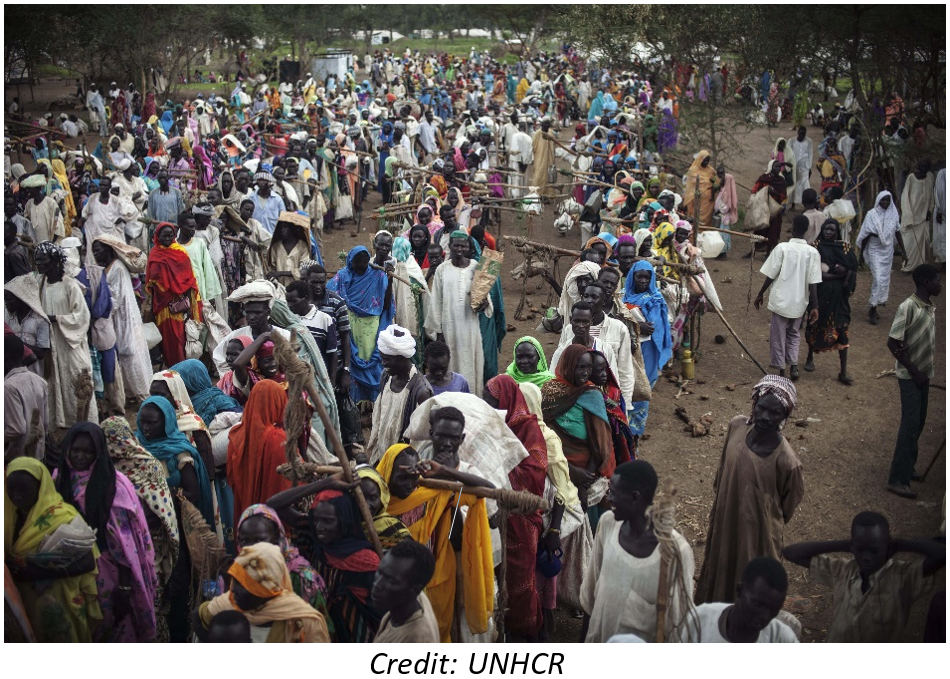‘World’s most unknown state-led mass crime’ – Criminal examination sought for deliberate starvation in South Sudan

A landmark investigation report has today been published by international human rights law firm and foundation, Global Rights Compliance, urging the international community to help to end deliberate starvation crimes being committed principally by South Sudan Government forces against its own citizens in South Sudan, damningly judged to have become ‘Africa’s largest refugee crisis.’
The year-long investigation led by Global Rights Compliance has established ‘a clear link between the use of civilian starvation as a method of warfare, targeted attacks on humanitarian aid workers and the mass forcible displacement of civilians’ in South Sudan. This new report spotlights deliberate starvation tactics being used by Government forces and allied militia, and by opposition forces on innocent civilians in South Sudan, throughout the conflict until now.
According to the United Nations, the threat to human life and the risk of famine has ‘never been higher’ in South Sudan, with over 8 million innocent people said to be in ‘imminent danger’ of famine, and over 4 million innocent civilians already falling victim to killing, enforced starvation, sexual and gender-based violence and forced displacement from their homes.
The full report, entitled “NO CHOICE BUT TO FLEE – Starvation and Displacement in Central Equatoria, South Sudan,” has been supported by a forensic open-source intelligence investigation conducted by the Centre for Information Resilience (CIR).
The report finds that all parties to the conflict have committed widespread human rights abuses and violations of International Humanitarian Law (IHL), including large-scale and systematic burning and destruction of homes and property, depriving civilians of objects indispensable to their survival (OIS), including through the destruction of food crops and markets, and impeding humanitarian access to the most vulnerable. These tactics have forcibly displaced hundreds of thousands of civilians, mainly to refugee camps in northern Uganda.
South Sudan is now the most dangerous place on earth for humanitarian aid workers to operate, following a series of violent attacks on aid workers from international NGOs including Médecins Sans Frontières (MSF) and the World Food Programme (WFP), forcing both organisations to temporarily stop the supply of food, healthcare and drinking water to innocent civilians in light of the risks to life.
A Bloody, Tragic Conflict
Almost ten years ago (December 2013), a tragic conflict which saw armed violence against civilians began in South Sudan. Killings, torture, sexual and gender-based violence, and large-scale destruction saw the country ripped in two, as Government forces and rebels embarked on a bloody civil war. To date, more than 400,000 South Sudanese have died as a result of the conflict, with hundreds of thousands more injured, displaced and otherwise severely impacted.
Global Rights Compliance’s 65-page report calls for an immediate examination by the international community into the mass suffering inflicted upon innocent civilians, one of whom anonymously described the situation in her chilling testimony:
“We are really disturbed by soldiers, the very people who should protect civilians. We have seen an increase of cases of looting; even when people are raped, they are also robbed of money and food. We understand that the soldiers are looting because they have not been paid for months. What does the Government expect if they give their unpaid servants guns?”
Since 2017, Global Rights Compliance has become the leading legal organisation on prohibiting, preventing and seeking accountability for mass starvation and associated violations. Global Rights Compliance’s starvation portfolio is led by British barrister Catriona Murdoch, who has led previous investigations and legal submissions in relation to Yemen, Syria and Tigray. The law firm supported and worked closely with the Swiss Government in 2019 to secure a historic amendment to international law on starvation, when the International Criminal Court formally adopted a landmark amendment to the Rome Statute which, for the first time, enabled the international investigation and persecution of the war crime of starvation in a domestic armed conflict.
Now, Global Rights Compliance’s year-long investigation into South Sudan has concluded with the publication of this report, authored by Ken Scott, Senior Legal Advisor, and Rebecca Bakos Blumenthal, Legal Advisor.
Former UN Commissioner and Senior Legal Advisor at Global Rights Compliance and Author of the NO CHOICE BUT TO FLEE report, Ken Scott, states:
“This well-documented report offers a pathway to hope for the millions of innocent victims of the bloody conflict in South Sudan, but to achieve change, the international community including the International Criminal Court, the United Nations, the African Union and governments around the world must step in and do their duty to hold those most responsible for the heinous crimes in South Sudan accountable.
“If no action is taken to recognise and investigate these crimes internationally, it is likely that thousands more innocent men, women and children will die, either from famine or on perilous journeys to escape the conflict in South Sudan.”
An Urgent ‘Call to Action’
Global Rights Compliance has issued an urgent ‘Call to Action’ to the international community, to demand that starvation crimes in South Sudan are recognised as gross violations of international law, and that perpetrators of war crimes are brought to justice.
The report, among other actions, calls for:
The United Nations Security Council to refer the situation in South Sudan to the International Criminal Court (ICC) to conduct a full investigation into alleged international crimes committed
Alternatively, for the International Criminal Court (ICC) to immediately open a preliminary examination into the South Sudan situation in order to hold accountable the senior persons most responsible for violations of international humanitarian law and crimes under the Rome Statute committed in South Sudan
Regional and domestic accountability and transitional justice mechanisms to be implemented in a transparent, inclusive, gender-aware and fair manner. In particular, for the transitional justice mechanisms envisaged under Chapter V of the R-ARCSS to be swiftly implemented, including the Hybrid Court, the Commission for Truth, Reconciliation and Healing, and the Compensation and Reparation Authority
National Governments to examine suffering inflicted on the South Sudanese people and the extent to which various actors are responsible, with a view to extending sanctions to all parties responsible for starvation-related conduct in South Sudan




